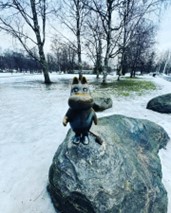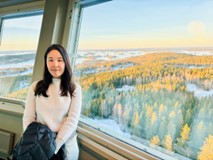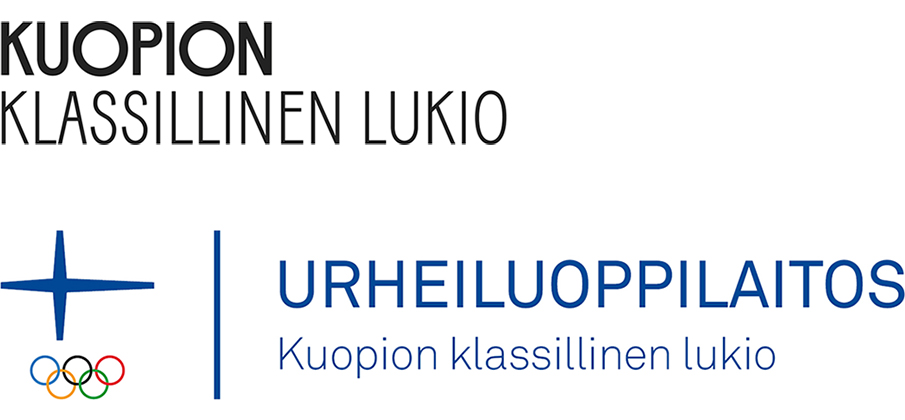Let’s be honest. Coming to Finland was not part of my plan before leaving Japan. When I heard from my agent about the possibility of visiting Finland in December, my first reaction was not entirely positive. The first thing that came to my mind was, “I am not prepared for the cold winter in that country at all! I wonder if I can handle the long winter days without sunlight…”
Before coming to Finland, I had been staying in the UK for four months, and I felt fed up with the gloomy and sunless weather. Although I knew Finland was a popular spot for educational professionals to visit, I hardly knew anything about it except for Moomin, its reputation as the happiest country in the world, cold weather, and its well-regarded education system.
When I arrived in Finland, the first time I stepped outside to catch a train to Kuopio, it was cold, but all I saw was white snow covering the platform, and I was struck by how quiet it was outside. “It’s cold but beautiful”—that was my first impression.
The first Finnish person I spoke to was a kind gentleman I met at the station, in front of a paid toilet. We both realized we had to pay and decided not to use it. Later, he was thoughtful enough to return to me and let me know that he had found a free toilet. My initial impression of Finland was already positive: a beautiful, peaceful winter landscape and a kind stranger who spoke good English.
My first day at Kuopio Klassillinen Lukio was also a pleasant experience. I was a bit nervous about visiting a new place, but the teachers warmly introduced themselves, provided me with information, and made me feel welcome. To be honest, I cannot say that I felt this way in all the schools I had visited. “People are nice in this school. I can do this,” I thought, feeling relieved. Even before arriving at school, I had already gained a good impression of the people in the town. Everyone I asked for help assisted me kindly and spoke fluent English. It reassured me that people were kind and that language barriers would not be a major issue.
Since I had little prior knowledge of Finland, I was able to observe things without preconceived notions. If I were to highlight three key aspects that stood out to me, they would be the strong “sense of trust,” a culture of “contentment,” and the government’s emphasis on education.
One of the most striking things I noticed in the classroom was that teachers did not discipline students as strictly as in Japan or other European countries I had visited. While observing lessons, I sometimes saw students chatting, using their phones, or playing games
on their computers. However, many teachers did not immediately stop them, and in most cases, the students eventually refocused on their tasks without being told.
When I asked teachers about this, they explained that telling students not to do something was often ineffective—if students wanted to engage in their studies, they would do so on their own. This perspective made sense. What I generally observed was students quietly studying in the halls on their own, attentively listening to teachers, even though I felt that many teachers spent more time explaining concepts, which I found remarkable.
I also noticed that Finnish schools had far fewer security measures than those in Japan or the UK. There were no fences surrounding the school, no ID checks, and the entrances were often left unlocked. Compared to Japan or the UK, schools seemed to operate smoothly with minimal security measures, reflecting the strong sense of trust in society.
During lesson breaks, I had several opportunities to talk with students and asked them why they thought Finland was one of the happiest countries. Many of them attributed it to their freedom of choice, the country’s high social welfare and security, and the quality of education.
From these conversations, I gained the impression that Finnish students tend to have a positive outlook and know how to appreciate what they have rather than focusing on negatives. They trust their schools, government, and country, as well as the people around them on a personal level. They understand the value of contentment.
Rather than imposing strict rules, Finnish teachers seemed to focus on giving students choices in many aspects of their education. One simple example was allowing students to choose from different assignment options.
Based on my observations, I believe that a sense of freedom (having choices) and trust contributes to Finnish students’ contentment. In fact, I experienced this firsthand—I felt much happier in Finland and kept asking myself why. My conclusion aligned with what I had observed: the combination of trust and personal freedom creates a strong foundation for well-being.
On a final note, I was truly impressed by how much the Finnish government prioritizes education. Schools are well-facilitated and well-equipped. Cooking classrooms have modern facilities so that students can learn in realistic settings. Craft rooms contain professional-grade machines and tools to prepare students for their future professions. School buildings are well maintained compared to my old, humble school in Japan.
The lesson curricula and textbooks are well-structured, offering students practical knowledge applicable to their daily lives. As a language teacher, I was particularly impressed by the textbook content. Schools in Finland seem to be operated based on rational and practical decision-making.
Before my journey to European schools, I had been questioning my career and life choices. I cannot say I have found the perfect answer, but I can confidently say that I was incredibly fortunate to have had this opportunity to visit Finland, even for just a month. The experience reshaped my thoughts on education and well-being.
I will miss the beautiful and peaceful winter wonderland, as well as the kind and gentle people I met. Oh, and one more thing—I had expected constant darkness, but I was totally wrong! The sunlight reflecting off the snow and filtering through the trees was absolutely stunning. 
There are many more wonderful things to share about Finland that I discovered during my stay, but I’ll end it here before it gets too long.
Shuko Ida

